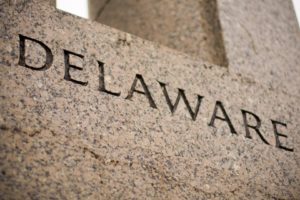Those who practice in or are familiar with the Delaware Court of Chancery are likely aware that it is a court of limited jurisdiction. Unlike most jurisdictions, Delaware never merged its courts of law and equity. “As Delaware’s Constitutional court of equity, the Court of Chancery can acquire subject matter jurisdiction over a cause in only three ways, namely, if: (1) one or more of the plaintiff’s claims for relief is equitable in character, (2) the plaintiff requests relief that is equitable in nature, or (3) subject matter jurisdiction is conferred by statute.” Candlewood Timber Grp., LLC v. Pan Am. Energy, LLC, 859 A.2d 989, 997 (Del. 2004). If the Court of Chancery lacks jurisdiction by statute, it “has only that limited jurisdiction that the Court of Chancery in England possessed at the time of the American Revolution.” El Paso Nat. Gas Co. v. TransAmerican Nat. Gas Corp., 669 A.2d 36, 39 (Del. 1995). Accordingly, parties seeking to take advantage of the Court of Chancery’s expertise in business disputes frequently endeavor to style their claims brought or the relief sought as equitable in nature.
In the past, the Court of Chancery has recognized equitable jurisdiction over claims for the release of money held in escrow. Beginning in Xlete, Inc. v. Willey, 1977 WL 5188 (Del. Ch. June 6, 1977), the Court held that such claims were sufficient to invoke equitable jurisdiction because, even if a party successfully won a judgment in the Delaware Superior Court for the sum held in escrow, the Superior Court (Delaware’s law court) would not have legal authority to actually compel delivery of the money to that party. This holding remained undisturbed for nearly fifty years, and indeed has been relied upon in decisions within the past decade. See, e.g., United BioSource LLC v. Bracket Holding Corp., 2017 WL 2256618, at *4 (Del. Ch. May 23, 2017); East Balt LLC v. East Balt US, LLC, 2015 WL 3473384 (Del. Ch. May 28, 2015); see also Haney v. Blackhawk Network Holdings, Inc., 2017 WL 543347 (Del. Super. Ct. Feb. 8, 2017) (transferring case to Court of Chancery to hear all claims, including claim for the disbursement of disputed funds in escrow).
However, recent decisions from the Court of Chancery have called into question the continued application of Xlete and the equitable jurisdiction over claims for the release of escrowed funds. Cases involving a request for release of escrowed funds create a tension between two different concepts raised in determining equity jurisdiction. On the one hand, equity jurisdiction only exists where there is no adequate remedy at law, and a dispute over the release of escrowed funds is fundamentally a fight over money the plaintiff contends it is owed, usually pursuant to a contract. On the other hand, while the underlying dispute may be one sounding in contract over money owed, the Superior Court lacks the authority to order a party holding particular funds in escrow to actually release them, raising the question of whether equitable relief is necessary. As discussed below, the ruling in Xlete has been construed narrowly in recent months, with the Court of Chancery resolving the tension by finding the cases are really ones for money damages. Consequently, parties and their counsel should be wary of continued reliance on Xlete in cases seeking the release of escrowed funds.
Elavon v. Electronic Transaction Systems Corp.
In Elavon v. Electronic Transaction Systems Corp., 2022 WL 667075 (Del. Ch. Mar. 7, 2022), plaintiff Elavon brought several claims against Electronic Transaction Systems and its former owners, including for release of funds that had been placed in escrow to satisfy potential indemnification claims. After one of the individual defendants moved to dismiss the action, Vice Chancellor Sam Glasscock III raised, sua sponte, the issue of whether the Court had subject matter jurisdiction over Elavon’s claims for release of escrowed funds. Elavon, 2022 WL 667075, at *1.
In arguing in favor of equitable subject matter jurisdiction, Elavon relied upon Xlete, East Balt, and Haney, pointing out that “only the Court of Chancery can issue an [injunction] directing the Escrow Agent to release the funds if it fails to do so.” Id. at *2 (internal quotation marks omitted) (emphasis in original). In response, Vice Chancellor Glasscock distinguished the cases cited by Elavon on their facts and stated that, to the extent Xlete and East Balt indicate that equitable jurisdiction should be had under the circumstances, the Court declined to follow their rationale. Id. at *3.
In particular, the Elavon Court took issue with what it described as the “speculative” nature of the argument in favor of equitable jurisdiction, explaining:
There is nothing in the pleadings that makes it likely that the escrow agent, post-decision in the Superior Court, would defy that Court’s determination of contract rights and breach its duties to the parties by refusing a consistent directive by the parties to release the funds. In other words, a complete and efficient remedy is available at law. The fact that an unexpected subsequent breach by the escrow agent might give rise to a need for equity to act does not make this matter one that requires Chancery jurisdiction. This would not be the tail wagging the dog; it would be an unanticipated second dog biting that tail—the possibility of such a speculative cause of action does not, to my mind, open the kennel of equity.
Id. at *2.
The Court also distinguished Xlete and East Balt because the plaintiffs there sought only the funds in escrow. In Elavon, the Court noted that “the damages sought exceed the value of the Escrow Fund.” Id. at *3.
The Court then dismissed the action for lack of subject matter jurisdiction, subject to transfer to Superior Court pursuant to 10 Del. C. § 1902, concluding that “[a] legal action cannot be transformed into an equitable one merely by suggesting that contingent relief, such as an escrow agent gone rogue, may necessitate an injunction.” Id. at *4.
ISS Facility Services, Inc. v. JanCo FS 2, LLC
For nearly a year, it appeared that Elavon might be an outlier from Xlete and its progeny, distinguishable on its facts. However, on June 20, 2023, Vice Chancellor Glasscock once again declined to find equitable jurisdiction over claims for the release of escrowed funds.
In ISS Facility Services, Inc. v. JanCo FS 2, LLC, 2023 WL 4096014 (Del. Ch. June 20, 2023), plaintiff ISS Facility Services brought three causes of action, including for declaratory judgment and specific performance of the contracts at issue. In arguing in favor of equitable subject matter jurisdiction, ISS Facility Services argued that “injunctive relief via specific performance is necessary to compel Defendants to issue instructions to an escrow agent to disburse those contested funds.” JanCo, 2023 WL 4096014, at *1. The Court disagreed.
In its analysis, the Court looked to the escrow agreement at issue, which provided that “disbursements can occur ‘only pursuant to (i) [Defendants’] written direction, (ii) a Joint Written Direction or (iii) a Final Order.’” Id. (alteration in original). The Court determined that a declaratory judgment issuing from the Superior Court would satisfy (iii) of the escrow agreement, making equitable relief compelling Defendants to comply with (i) unnecessary. Id. at *2. In addition, the computation of the amount owed under the contracts was a matter of contractual interpretation, a “quintessential exercise of law.” Id. As a result, plaintiffs had an adequate remedy at law, and the Court found a lack of equitable jurisdiction.
In contrast to Elavon, the facts in JanCo did not raise any additional issues or damages beyond the release of the funds held in escrow. Thus, JanCo seemingly expanded the reasoning detailed in Evalon to all actions for the release of escrowed funds without narrow factual limitations.
Buescher v. Landsea Homes Corp.
In September of this year, the Court again determined that it lacked subject matter jurisdiction to hear a claim involving the release of funds from escrow. In Buescher v. Landsea Homes Corp., 2023 WL 5994144 (Del. Ch. Sept. 15, 2023), the plaintiff sought an order of specific performance requiring defendant to direct an escrow agent to release $5 million held by the parties arising out of plaintiff’s purchase of defendant’s interest in a Florida LLC. Citing to JanCo, Vice Chancellor Glasscock stated: “Our recent case law has suggested that jurisdiction based solely on a request for the aid of equity to recover funds in escrow is inadequate to invoke subject matter jurisdiction, where the availability of a declaratory judgment at law makes the need for injunctive relief unlikely.” Id. at *1. Accordingly, the Court ordered the parties to brief whether the Court had subject matter jurisdiction. Interestingly, both plaintiff and defendant sought to keep the case in the Court of Chancery and even filed a joint brief. Given the recent case law finding the Court lacked jurisdiction over claims to release escrowed funds, the parties attempted to obtain jurisdiction based on the defendant’s equitable fraud counterclaim. The Court rejected this argument, finding that the parties failed to allege a special relationship between the commercial counterparties to the contract, which is a requirement for equitable fraud. Therefore, the Court dismissed the case, subject to the parties applying for a transfer to Superior Court.
Conclusions
Multiple conclusions can be drawn from the decisions in Elavon, JanCo, and Buescher. First, these cases serve as a reminder that, like the majority of trial courts in the United States, in the Court of Chancery, horizontal stare decisis does not operate as an absolute bar against decisions departing from relevant precedent. However, this should not be viewed, at least without future evidence, as a disagreement among the current members of the Court over whether it has jurisdiction over post-closing escrow release cases. To the contrary, as regular Chancery practitioners know, the decisions of the Court rarely significantly diverge, and it would be unsurprising if other members of the Court continued the trend of Vice Chancellor Glasscock’s recent decisions rejecting escrow release as a basis for equitable jurisdiction.
Second, parties and their counsel should carefully consider the appropriate Delaware court for claims relating to the release of escrow funds, including what potential grounds exist to seek equitable jurisdiction. The Court of Chancery will not hesitate to raise subject matter jurisdiction sua sponte, which could lead to added costs and delays that should be considered when determining choice of venue. Indeed, this occurred shortly after Vice Chancellor Glasscock issued his ruling in JanCo. The day after that decision was issued, Vice Chancellor Paul A. Fioravanti Jr. directed the parties to a pending action for the release of escrowed funds to provide the parties’ positions as to the application of JanCo to that action. See Four Cents Holdings, LLC v. M&E Printing, Inc., 2023 WL 4561491 (Del. Ch. July 14, 2023) (ORDER). The parties in Four Cents Holdings conferred and dismissed the action for lack of subject matter jurisdiction, electing to transfer it to Superior Court pursuant to 10 Del. C. § 1902.
Finally, practitioners have no reason to despair if Chancery jurisdiction over post-closing escrow disputes has become a thing of the past. While the Court of Chancery has well-earned its reputation as the preeminent business court in the country, the Complex Commercial Litigation Division of the Delaware Superior Court (“CCLD”), though much younger in existence having been founded in 2010, has proven to be another excellent venue for the resolution of complex business disputes, such as the ones arising from post-closing litigation and involving escrowed funds. Indeed, the Delaware Supreme Court recently recognized the CCLD’s expertise in complex business disputes by issuing an order, at the request of the Chancellor and President Judge of the Superior Court, allowing for a one-year trial period for the CCLD judges to be “designated with the consent of the Chancellor to sit as a Vice Chancellor on the Court of Chancery for the purpose of hearing and deciding cases filed under Section 111 [of the Delaware General Corporation Law] as selected by the Chancellor and the President Judge.” Accordingly, regardless of whether post-closing disputes over escrowed funds are heard in the Court of Chancery or CCLD, practitioners and their clients can expect timely and skillful resolution of their cases.
Jason C. Jowers is a director and Justin C. Barrett is an associate at Bayard, P.A. in Wilmington, Delaware, where they practice in the areas of corporate, alternative entity, and complex commercial litigation.





